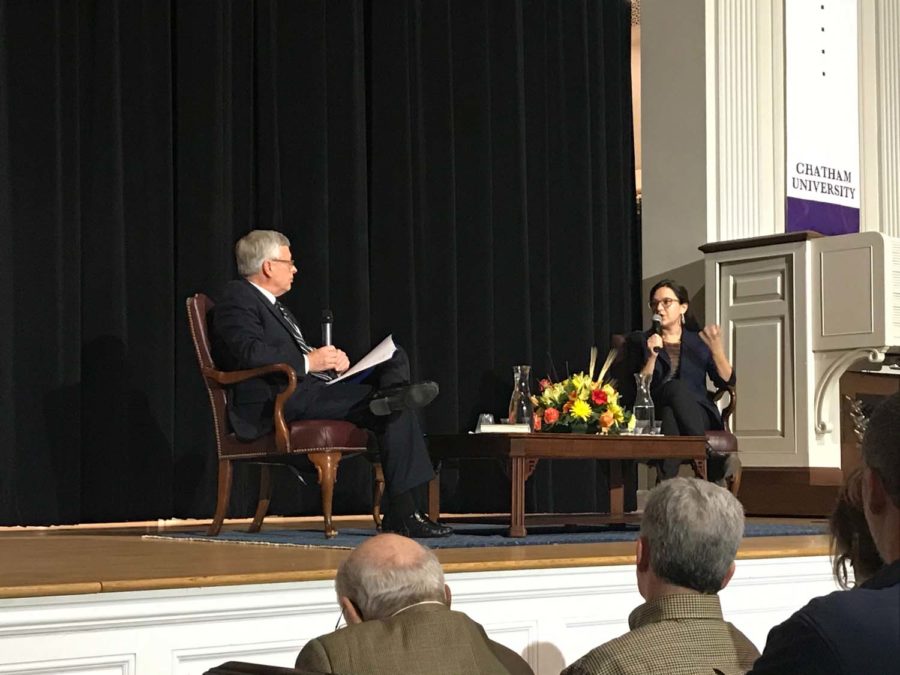NYT columnist Bari Weiss stops in Pittsburgh on book tour
Carolyn Brodie | Contributing Writer
Bari Weiss, opinion staff editor and writer for the New York Times, speaks about her book “How to Fight Anti-Semitism” at Chatham’s Campbell Memorial Chapel.
November 5, 2019
Bari Weiss is a Squirrel Hill native, a controversial New York Times columnist and, according to The Jerusalem Post, the 7th most influential Jew in the world.
She returned to Pittsburgh Monday evening, where she addressed an audience of about 200 on the topic of how to fight anti-Semitism — also the title of her latest book.
Former Pitt Chancellor Mark Nordenberg joined Weiss at Chatham University for a discussion of “How to Fight Anti-Semitism.” The event’s reserved tickets and large turnout were like “my bat mitzvah on steroids,” Weiss said.
The October 27th massacre at Tree of Life Synagogue last year was the deadliest anti-Semitic attack on American soil. Though the shooting renewed nationwide conversations about acts of hatred toward Jewish communities, Weiss maintained that the rising anti-Semitism today is a return to deep-seated and centuries-old stereotypes about Jews.
The New York Times reported Monday that a man had plotted to bomb a Colorado synagogue, but his attempt was thwarted.
“Just today someone tried to blow up a synagogue in Colorado. The reality we are living in is a return to the norm for Jews,” Weiss said. “That I almost never had to think of [anti-Semitism] growing up was a blessing. [The past years of safety for Jews in America] were a holiday from history.”
Weiss’ personal experiences with anti-Semitism are largely confined to when she was “a grade school student at Community Day School and the kids on the Catholic-school school bus would drive by the bus stop and call her [epithets related to her Judaism],” she said. However, her views have elicited hatred and criticism from those on both sides of the political spectrum who deem them to be too controversial.
Her discussion at Chatham did not draw any protesters, but her opponents have been vocal in antagonizing her in the past. Vanity Fair described her as “a favorite punching bag for lefties with itchy Twitter fingers.”
Nordenberg, who is a fan of the book and has read “How to Fight Anti-Semitism” three times since it was published earlier this year, commented on her distinction between anti-Jewish discrimination and anti-Semitism — the former, according to Weiss, is prejudice against Jews and the latter is seeking erasure of Jews. Nordenberg also noted her distinction between anti-Semitism from white nationalists and anti-Semitism from the far left.
“Marginalization is not murder, but both are destructive,” Nordenberg said.
Weiss agreed that though discrimination and especially leftist anti-Semitism were not genocidal, both can eventually lead to Jewish erasure.
“From the right, we see a threat of destruction from white supremacy. From the left that cloaks their anti-Semitism in familiar language [that calls us to denounce our Judaism and Zionism] with words like ‘social justice’ and believes that Jews are handmaidens of white supremacy, we see a threat to our Jewish souls, rather than to our Jewish bodies,” Weiss said.
Weiss also spoke to the complex political party engagements within the Jewish community. While many Jews are liberal, many also support President Trump for his pro-Israel policies.
“Seventy percent of Jews vote Democrat, so it is more emotionally difficult to see anti-Semitism from the left,” Weiss said. “I also don’t think [allegiance to Trump’s] policies is worth what he is doing to the world. If it were not convenient for Trump to support Israel, he would bail. Look at what he just did with the Kurds — that is how little alliance and loyalty mean to this president.”
Though the audience skewed older, Weiss’ messages resonated with students present for the discussion, including Chatham’s Jewish Students’ Association president Leah Berman-Kress and sophomore psychology major Cassie Gerr.
“Weiss was moving and put words to everything I was thinking,” Gerr said.
Berman-Kress said Weiss’s appearance at Chatham following the one-year commemoration of the Tree of Life massacre was particularly relevant.
“Hosting Weiss was so timely with everything happening in Pittsburgh, and her book is a good one for everyone to read,” Berman-Kress said.
Weiss was blunt about the threat anti-Semitism posed for the Jewish community, but also said she believed there was hope to be found in its aftermath, especially with Pittsburgh’s commitment to put an end to hatred in the City.
“The Tree of Life massacre was both a return to pogroms of Europe, but was also a departure from that because unlike in Europe, other people stood up for us with visceral reactions that an attack on us was also an attack on them,” Weiss said.
Pittsburgh’s “Stronger than Hate” message and consequential movement were the embodiment of unity for Weiss, she said.
“Pittsburgh’s values are such that we do not stay within religious or political lanes, we reach out. Mr. Rogers’ neighborhood was a lived reality [after the attack],” Weiss said.
Nordenberg ended the discussion by alluding to lines from Weiss’ book’s opening chapter, where she writes, “This is a book for Jew or Gentile who cannot look away from what is brewing in this country and in the world and wants to do something to stop it.”
“I am glad you are a daughter of Pittsburgh, [Bari],” Nordenberg said.








